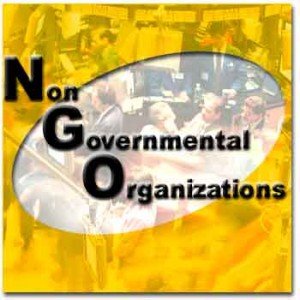“I love a challenge and saving the Planet seems like a good one.”
– Paul Stamets

A proper definition of an NGO or non-governmental organization (NGO)/ non-profit organization (NPO) is a legally constituted organization created by legal people that operates independently from any government. This term originated from the United Nations (UN) and is used to denote to organizations that do not form part of the government and are not conventional for-profit business. If NGOs are funded totally or partially by government, the NGO maintains its non-governmental status by omitting government representatives from membership in the organization. The term is used only for organizations that pursue some wider social aim that has political aspects, but that are not openly political organizations such as political parties. The Non-governmental organizations forms a heterogeneous group and it has a long list of organization working in different areas with varied scope of work. The alternative terms used in addition to “NGO” include private voluntary organizations, civil society, independent sector, self-help organizations, grassroots organizations, volunteer sector, transnational social movement organizations, and non-state actors (NSA’s).
NGOs are difficult to define and classify due to the term’s dissonant use. To attempt a classification of NGOs calls for a framework that includes the orientation and the organization’s level of operation. An NGO’s orientation refers to the type of activities an organization does. These activities might include environmental, development, or advocacy work. An NGO’s level of operation indicates the scale at which an organization works on, like the difference in work between an international NGO and community or national NGO.
By orientation:
Charitable Orientation often involves a top-down paternalistic effort with meagre participation by the “beneficiaries”. It includes NGOs with activities directed toward meeting the needs of the poor distribution of food, clothing or medicine; provision of housing, transport, schools. Such NGOs may also undertake relief activities during a natural or man-made disaster.
Service Orientation works upon activities such as the provision of health, family planning or education services in which the programme is designed by the NGO and people are expected to participate in its implementation and in receiving the service.
Participatory Orientation is characterized by self-help projects where local people are involved particularly in the implementation of a project by contributing cash, tools, land, materials, labour etc. In the classical community development project, participation begins with the need definition and continues into the planning and implementation stages. Cooperatives often have a participatory orientation.
Empowering Orientation is where the aim is to help poor people develop a clearer understanding of the social, political and economic factors affecting their lives, and to strengthen their awareness of their own potential power to control their lives. Sometimes, these groups develop spontaneously around a problem or an issue, at other times outside workers from NGOs play a facilitating role in their development. In any case, there is maximum involvement of the people with NGOs acting as facilitators.
By level of operation:
Community-based Organizations (CBOs) arise out of people’s own initiatives. These can include sports clubs, women’s organizations, neighbourhood organizations, religious or educational organizations. There are a plethora of these, some supported by NGOs, national or international NGOs, or bilateral or international agencies, and others independent of outside help. Some are devoted to raising the consciousness of the urban poor or helping them to understand their rights in gaining access to needed services while others are involved in providing such services.
Citywide Organizations include organizations such as the Rotary or lion’s Club, chambers of commerce and industry, coalitions of business, ethnic or educational groups and associations of community organizations. Some exist for other purposes, and become involved in helping the poor as one of many activities, while others are created for the specific purpose of helping the poor.
National NGOs include organizations such as the Red Cross, YMCAs/YWCAs, professional organizations etc. Some of these have state and city branches and assist local NGOs.
International NGOs range from secular agencies such as Redda Barna and Save the Children organizations, OXFAM, CARE, Ford and Rockefeller Foundations to religiously motivated groups. Their activities vary from mainly funding local NGOs, institutions and projects, to implementing the projects themselves.
In the nineteenth century, the first of the modern NGOs began to appear. These were, like the earlier religious aid groups, humanitarian in their goals, but also had no hesitation to use diplomatic and political muscle to get their way. The Anti-Slavery Society was such an organization and in the early nineteenth century it was instrumental in getting slavery banned in most parts of the world. The society is still around, because slavery has not completely disappeared. A more recognizable organization is the Red Cross (and later Red Crescent) societies. These were first formed in the 1860s to campaign for more humane treatment of prisoners, the wounded and civilian victims of warfare. By the twentieth century, the Red Cross was also active in all manner of humanitarian activities. A century ago, the Red Cross was the most effective, powerful and recognized NGO that ever existed. But it was only the beginning.
They play an important role in the struggle against poverty and underdevelopment. Their direct involvement in relief, rehabilitation and development efforts is presumably expected to bring about incremental change, which leads towards sustainable growth. However, in many areas around the country, NGO intervention is not yielding the desired effects. Development has become an elusive, utopian proposition. Living conditions are showing continuous signs of deterioration and there is little or no hope in sight. Misery, apathy, stagnation, corruption and abject poverty have become permanent features of our ailing nation.
Many of them live in plush apartments, or five star hotels, drive SUV’s, earn a two figure multiple of the local average wage. They are busybodies, preachers, critics, do-gooders, and professional altruists. They are parasites who feed off natural and manmade disasters, mismanagement, conflict, and strife. Always self-appointed, they answer to no constituency. Though unelected and nescient of local realities, they confront the democratically chosen and those who voted them into office. A few of them are even enmeshed in crime and corruption. They are the non-governmental organizations, or NGOs.
The encroachment on state sovereignty- enshrined in numerous treaties and conventions- allows NGOs to get involved in hitherto strictly domestic affairs like corruption, civil rights, the composition of the media, the penal and civil codes, environmental policies, or the allocation of economic resources and of natural endowments, such as land and water. No field of government activity is now exempt from the glare of NGOs. They serve as unauthorized witnesses, judges, jury and executioner rolled into one.
Regardless of their persuasion or modus operandi, all NGOs are top heavy with entrenched, well-remunerated, extravagantly-perked bureaucracies. Opacity is typical of NGOs. Amnesty’s rules prevent its officials from publicly discussing the inner workings of the organization – proposals, debates, opinions – until they have become officially voted into its Mandate. Thus, dissenting views rarely get an open hearing. Contrary to their teachings, the financing of NGOs is invariably obscure and their sponsors unknown. Indeed, the bulk of the income of most non-governmental organizations, even the largest ones, comes from usually foreign powers.
Many NGOs serve as official contractors for governments or companies. NGOs serve as long arms of their sponsoring states- gathering intelligence, furbishing their image, and promoting their interests. There is a revolving door between the staff of NGOs and government bureaucracies the world over. Many host governments accuse NGOs of unwittingly or knowingly serving as hotbeds of espionage. Very few NGOs derive some of their income from public contributions and donations. The more substantial NGOs spend one tenth of their budget on PR and solicitation of charity. All NGOs claim to be not for profit- yet many of them possess sizable equity portfolios and abuse their position to increase the market share of firms they own. Conflicts of interest and unethical behaviour abound.
To the public, NGOs are usually international organizations that operate independently of, and sometimes in defiance of, governments in order to achieve humanitarian and political goals, push their own agenda or simply to encourage international relations and the flow of information. These days, the NGOs have become a major, although not always decisive, factor in international relations. There are many problems with NGOs, and more are becoming visible to the public. The Western employees of NGOs, while not highly paid, and infused with a certain degree of idealism, do come to disaster areas as a bunch of outsiders who have a higher standard of living, and different, sometimes dangerous (according to the locals) ideas. Several years ago, all these outsiders brought with them was food and medical care. The people on the receiving end were pretty desperate, and grateful for the help. But NGOs have branched out into development and social programs. This has caused unexpected problems with the local leadership. Development programs disrupt the existing economic and political relations. The local leaders are often not happy with this, as the NGOs are not always willing to work closely with the existing power structure.
While the local worthies may be exploitative, and even corrupt, they are local, and they do know more about popular attitudes and ideals than the foreigners. NGOs with social programs (education, especially educating women, new lifestyle choices and more power for people who don’t usually have much) often run into conflict with the local leadership.
Although some of the problems are from Western NGOs, most of the hassles come from local NGOs. Some of the latter have been found to be fronts for Islamic terrorist organizations. Makes sense, as al Qaeda is basically an NGO with a unique mission. All this is a big change from what NGOs are meant to be.
The NGOs are very media savvy and one thing NGO staffers do not hide is the attitude that they are serving a higher purpose and must be given special treatment by any mere government organization.
NGOs are also coming to realize that the problems they are trying to help out with, are part of much larger tragedies. The big issues, like “globalization” (which is basically blaming “capitalism” for the world’s ills) or Islamic terrorism (too scary for most NGOs to deal with), are danced around for political reasons. No doubt, NGOs do raise legitimate issues. But not all NGOs are created equal. Very few do fabulous work — while others do not.
The larger number of NGOs has brought in many incompetent (or just less competent), or even criminal NGOs. So some of the major NGOs are now calling for some regulation. Right now, anyone can play. Now the established NGOs, in order to preserve their stature, clout, and cash flow, want to keep a lot of the little players out. Thus it has come full circle, with NGOs forming their own NGO government in order to establish some kind of order.
You might like reading:

This AD will make you cry ! #AirDeccan
This Air Deccan AD will simply make you cry. One of the best ADs ever by this budget airline ! Tags: air deccan airline amazing
UTOPIA – Rhythm of Nations @ SIBM Bengaluru
Utopia is hosted by the International Relations Committee (IRC) of Symbiosis Institute of Business Management (SIBM), Bengaluru. It is one of the largest student events organized in the college. It encourages cultural relationships between Symbiosis and other international universities. The event coincides with the birthday of our beloved Dr. S.B. Majumdar, founder of Symbiosis Society. The concept of Symbiosis and […]






























